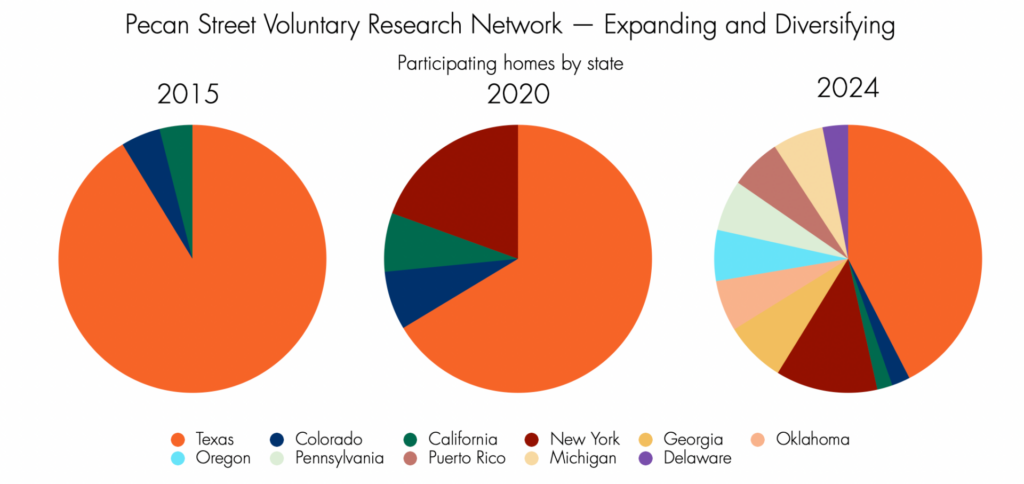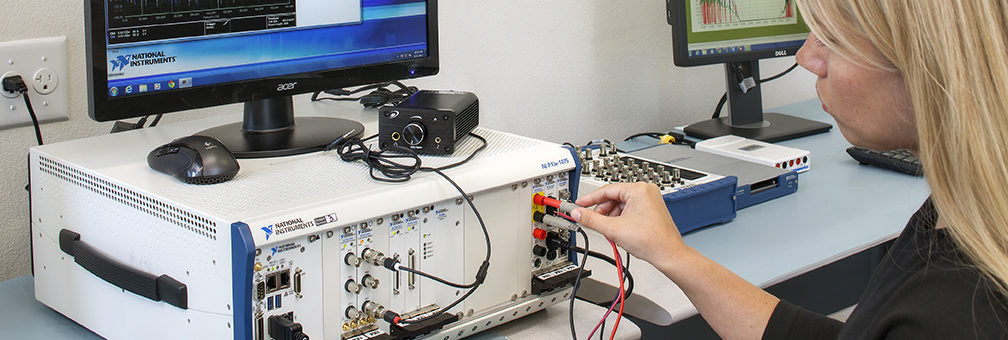
Innovation at Pecan Street
Breaking ground in the field, in communities, in the lab and in the cloud.
Innovation In Field Research — Building An Army of Citizen Scientists
Pecan Street’s research expertise was born in Austin’s Mueller neighborhood, where we first equipped existing homes with advanced energy monitoring equipment. Since 2009, our network of volunteer research participants has grown in number, geography, scope, and expertise. We now have participants in 10 states and Puerto Rico, including solar and storage customers and electric vehicle drivers.
Energy generation and use are measured at intervals ranging from one second to one minute — 24/7/365 — and can be viewed securely online by participants. Hosted on-site and protected with DOE-level security, our energy database is the largest real-world open energy database on the planet. It’s available (securely, without participant identification) to university researchers and Pecan Street’s clients.
This unique network allows researchers to simulate use and generation scenarios and quickly deploy hardware or software for testing to an enthusiastic and savvy user base. We offer field testing for technical certification (like UL-certified) and for proof-of-concept or performance verification of energy and water solutions.
Innovation In Communities
Technology and policy are powerful levers in the clean energy transition. But people will be the driving force. At Pecan Street, we believe that means everyone, everywhere – not just climate warriors, clean tech enthusiasts, early adopters or customers in one part of the country.
Unfortunately, energy research is a relatively new field, and it significantly underrepresents “regular people,” especially people of color, lower-income families, and those who rent their homes. That’s why Pecan Street is so focused on including these underrepresented customers as we expand into other regions with different weather, energy fuel mixes and housing stocks.
Since our launch in Texas, we have strategically grown our network to include participants in 10 states and Puerto Rico. With each new market, we improved the racial, house type, weather, fuel mix, urban/rural, and income representation in energy research and leveraged the expertise of local community-based organizations who know the neighborhoods, the neighbors, and the unique energy challenges and opportunities of each region.

Innovation In the Lab – Invent, Test, Verify

Pecan Street’s testing and verification lab is specially configured for testing hardware or software that generates or manages power at the building or device level, communicates wirelessly or integrates energy use data into its operations – including water measurement and metering products and technology.
The 3-story, 3,800 square-foot lab is equipped with multiple workstations and testing configurations. It has a split-phase 800A electrical service, south- and west-facing solar arrays, multiple conduit raceways, AC and DC distribution buses, all LED lighting, a full building automation system, and zonal refrigerant air conditioning. With a full set of appliance stub-outs on every floor, the lab can simulate three residential structures for demand response, fuel cell and building management scenario testing. The lab can also test natural gas fuel cell or combined heat and power micro-turbines up to 10-15kWp output.
And that’s just the building. Led by engineers who pioneered Pecan Street’s sophisticated data collection process, our staff has invented wireless measurement technology and microgrid prototypes and works with companies to test and verify their hardware and software innovations.
Pecan Street developed, hosts and maintains the largest database of consumer electricity and water use in the world. Our database of high-resolution electricity measurements from hundreds of homes spanning the past several years is unparalleled by any other data source. Circuit-level energy use data from hundreds of homes is provided to the research community and businesses via Pecan Street’s Dataport through our research and commercial license program.
Powered by our groundbreaking research, our database grows by 15 billion data points a day and is available — in real-time — to more than 2,000 university researchers from 60 countries.
Pecan Street’s datasets provide a pathway to enhanced grid stability by providing information on grid conditions at the point of use. With an understanding of how popular technologies impact the grid, solutions that enhance grid stability and capacity can be adopted.
Visit Dataport or email info@pecanstreet.org for more information on licensing opportunities.





